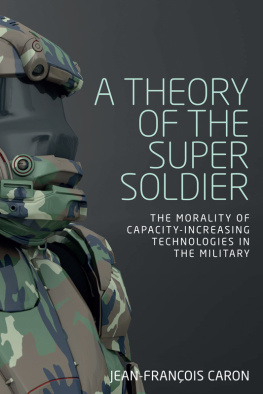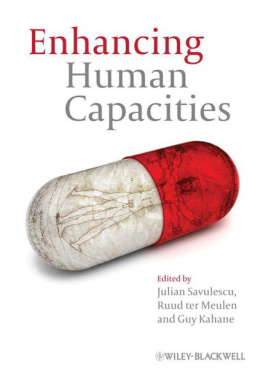1
Conceptual clarifications: distinguishing capacity-restoring and capacity-increasing technologies
It would be a truism to say that we currently live in a world where optimization is a dominant norm. We are indeed exposed on a daily basis to advertisements and undesired emails that are proposing to increase our muscular mass or our performance in many domains. The military world is no exception and is probably the sphere that, as the reader will soon realize, has taken this idea to its extremes, sometimes with terrible and harmful consequences for the soldiers. Nowadays, this trend has reached a science-fiction-like nature through the development and use of body armours and medicines that will soon allow service personnel to perform their duty in similar fashion to Iron Man, Batman, or Captain America.
However, before discussing the problems associated with the question of super soldiers, it is first necessary to establish an important conceptual clarification, so that the reader can understand precisely what this book is about and the moral issues it raises. We indeed need to understand what differentiates technologies aiming to restore individuals physical or psychological faculties from those looking to increase them. While the former type of technology finds its moral justification in sound and convincing arguments, the latter are seen by certain authors as being more questionable. The main reason is undoubtedly the fact that they tend to provide their beneficiaries with advantages over others. For understandable reasons, our modern world, which is established on the notion that everyone is the bearer of unalienable and equal natural rights, has problems in coping with the prospect of capacity-increasing technologies. One consequence of this imbalance finds an echo in the military world, as the development and use of capacity-increasing technologies will, of course, end up creating two classes of combatants: those who can benefit from them and will consequently be less vulnerable to being wounded or killed, and those who do not have access to them and will consequently be more vulnerable to the deadly consequences of warfare. This imbalance between enemy combatants is seen by some authors as ethically problematic and as accordingly necessitating a negative stance regarding these technologies. As it will be argued in this chapter, this view is inaccurate. Of course, the military imbalance that results from the development of sophisticated technologies should not be ignored for certain weapons (especially drones), but capacity-increasing technologies are not ethically flawed, despite allowing some combatants greater chances than others of evading wounds or death on the battlefield. The primary reason is that they do not contribute to making their beneficiaries totally immune against lethal risks and, consequently, are not in contradiction to the way legitimate killing during warfare is morally established.
Capacity-restoring and capacity-increasing technologies in the military
The latter refers to treating someone who is suffering from a malfunction or a pathology that reduces her or his capacity to act like a normal human being, by giving her or him medicines or by using technology. As an example of this, we might mention of the use of Ritalin to treat attention deficit hyperactivity disorder (ADHD), which, according to the American Psychiatric Association, affects nearly 5 per cent of all children aged between four and seventeen. This disorder restricts the ability of those affected to become organized or to focus on tasks, and increases their tendency to make careless mistakes, not to follow social rules, to forget daily activities, and to be easily distracted by trivial noises or events, which, of course, seriously damage their chances to pursue their education at the same speed as their peers who are not affected by the disorder. This is why drugs, such as Ritalin, and special educational resources are seen as means to help them fight the associated problems and to not to be left behind other. In the same way, spectacles, laser eye surgery, and hearing implants to correct optical or auditory deficiencies, as well as replacement limbs and the use of medication to correct erectile dysfunction or to treat dwarfism with human growth hormones, can be seen as medical ways to restore someone's capacities to what is considered normal. Even sports organizations allow some of their athletes to use drugs in order to correcting medical problems that prevent them from performing at their full capacities. For instance, the International Cycling Union sometimes uses therapeutic use exemptions to grant athletes who are suffering from asthma or allergies the right to use substances that would normally be regarded as performance-enhancing agents. The famous Tour de France winners Christopher Froome and Bradley Wiggins have both been granted such exemptions, for use of the corticosteroid prednisolone to treat asthma in Froome's case, and of salbutamol, formoterol, budesonide, and triamcinolone acetonide to treat Wiggins's allergy to pollen.
and strength, as well as genetic manipulation to increase human lifespans or give new sensory-motor abilities.
Generally, technologies that have been primarily developed in order to restore people's capacities are diverted by individuals who wish to increase their performance beyond the normal. This is especially the case with students who are not suffering from ADHD but who nonetheless use Ritalin and related drugs before taking their Scholastic Aptitude Test (SAT) and other college admission examinations, as well as the use of Viagra or Cialis by men who are not suffering from impotence but who wish to enhance their sexual performance. Sports are probably the primary example of this misuse of capacity-restoring drugs. Nowadays, an almost endless list of athletes are caught for using human growth hormones or erythropoietin (EPO), a drug that was originally designed to treat people suffering from anaemia or inflammatory bowel disease and to increase the production of red blood cells in cancer patients.
), which would make it possible for every soldier to accomplish with great ease what was considered, until it was achieved in 1954 by Roger Bannister, to be impossible for the human body: to run a mile in less than four minutes. Some myths indicate that people have been trying for over a thousand years to break this barrier, sometimes by using a form of encouragement such as a bull behind them as an incentive to run faster. With the help of an exosuit-like device, the jetpack has shown that that this once unrealizable dream is now within the reach of anyone who is minimally physically fit. The development of the Z-Man technology follows the same path by allowing soldiers to climb walls like lizards while carrying a full combat load.
) have also emerged regarding the use of a new medication called propranolol, which could erase the effects of terrifying memories and treat soldiers who are suffering from post-traumatic stress disorder (PTSD).
, p. 16). The two are also significantly different when viewed from a moral perspective. Indeed, in contrast to capacity-increasing technologies, the use of capacity-restoring technologies or medicines lies on solid ethical principles associated with Modernity. This is what the next section will examine.
Some important moral questions
As a consequence, the capacity to pursue happiness was, of course, unequal in such societies.
) is a way to ensure that the theoretically equal capacities that human beings have to fulfil their own conception of the good life have empirical meaning. This is why many liberal societies have government subsidies that allow citizens who do not have sufficient financial resources to meet the cost of court cases and benefit from free legal aid. Once again, such a special programme is not designed to allow certain citizens to enjoy unjust and unequal advantages over their compatriots. It is a way to make sure that the notion that every citizen in a liberal society should be able to enjoy a fair trial is not simply a theoretical idea. One can indeed easily imagine what this right would mean for someone living in poverty who is unable to afford a lawyer. Without knowing the jurisprudence, the way a trial is organized, and how to cross-examine witnesses, it is obvious that her or his right to enjoy a fair trial would not be the same as that of someone who is able to hire the best lawyers in town. Accordingly, the appointment of a duty solicitor for low-income individuals should not be seen as a privilege, but rather as a means to fully allow them to benefit from a fair and equal trial. Such differentiated treatments grow naturally from the politics of equal dignity as necessary conditions to ensure that our individual right to pursue happiness will not be restricted by external causes that are linked to contingencies over which we may not always have control.









